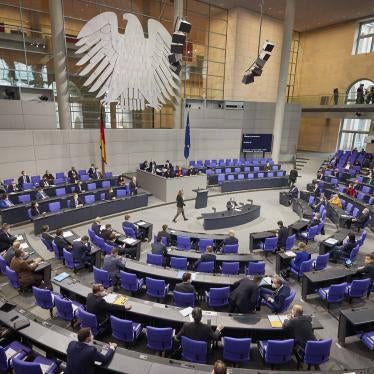(New York) - The newly elected government in Pakistan should abolish the death penalty, Human Rights Watch said today in a letter to Prime Minister Yusuf Raza Gillani.
Until the death penalty is abolished by an act of Parliament, Pakistan should announce an immediate moratorium while the government establishes a commission to review the application of the death penalty, the offenses for which it can be applied, and implements reforms to ensure that international fair trial standards are met.
Human Rights Watch stated in its letter that crimes carrying the death penalty have significantly increased in recent years under the government of Pervez Musharraf, resulting in a much higher number of death sentences and executions. Out of the more than 31,400 convicts in the country, nearly a quarter – more than 7,000 individuals, including almost 40 women – have been sentenced to death, and are either involved in lengthy appeals processes or awaiting execution. In 2007, 309 prisoners were sentenced to death and 134 were hanged. Most of those sentenced to death are poor and illiterate. Some face discrimination as members of religious minority communities. Many were held without due process of law and faced trials that did not meet international fair trial standards.
“The number of persons sentenced to death and executed every year in Pakistan is among the highest in the world,” said Brad Adams, Asia director at Human Rights Watch. “If the new government is really interested in justice, it would end this unacceptable state of affairs.”
Human Rights Watch said that torture is endemic in Pakistan and can lead to wrongful convictions and the execution of innocent people. Lawyers and human rights activists believe that there are many cases where the person executed was innocent or where capital punishment was used to settle political scores.
Human Rights Watch also expressed concern at the use of the death penalty by special courts like the anti-terrorism, narcotics and military courts, all of which fail to deliver fair trials, not least because these courts are not independent of the executive.
So long as the death penalty remains in force, Human Rights Watch urged the Pakistani government to ensure reforms are put in place before any death sentence is handed down or carried out. These include ensuring that defendants in death penalty cases have prompt access to competent counsel; that torture and other ill-treatment is not used to obtain confessions or evidence; and that all trials meet international fair trial standards and other relevant provisions of Pakistani and international law.
“There are serious weaknesses in the legal system that lead to unjust executions,” said Adams. “The new government should place reform at the center of its agenda.”
On December 18, 2007, the United Nations General Assembly passed a resolution by a wide margin calling for a worldwide moratorium on executions. In September 2008, the General Assembly will reopen discussion on the death penalty.
“The new Pakistani government can distinguish itself from Pervez Musharraf’s military rule by telling the General Assembly in September that it has put a stop to the death penalty,” said Adams.
Human Rights Watch opposes the death penalty in all circumstances because it is a punishment of an inherently cruel, inhuman and final nature.




